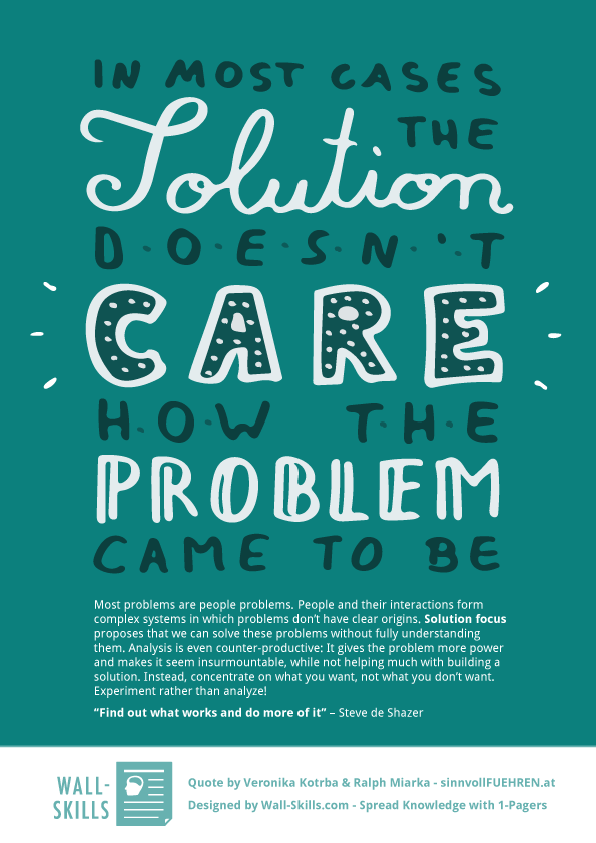you read “In most cases the solution doesn’t care why the problem came to be”? When I first heard it, it was eye opening!
See, I work in IT. I have a master’s degree in Computer Science. I’m a technical person and I’m surrounded by fellow technical people. And when us technical folks have a problem, we analyze that problem. A lot. In depth. How are we supposed to solve it, if we don’t understand exactly how it came to be? Because technical problems usually have a chain of causality. So understanding the problems helps solving it. The same is not true for people- and interaction-problems! And those are the majority of problems.
These non-technical problems do not have clear causality. People and organizations form complex systems that influence each other in too many ways to solve by analyzing them to death. You only give the problem more power, make it seem insurmountable.
“Problem talk creates problems, solution talk creates solutions.” – Steve de Shazer
Solution-focused coaching is based on the radical idea that you can solve many a problem without understanding it fully. You “find out what works and do more of it” (also Steve de Shazer).< As many coaching and communication techniques, the origins of solution focus are in family therapy: In the late 70s Steve de Shazer, his wife Insoo Kim Berg and others created this new brief therapy approach that took significantly less time than “normal” therapeutic approaches while having the same success rate. I’ve had similar success with retrospectives that concentrate on building solutions instead of dissecting the problem. It might still be valid to listen to problems, because teams need to feel heard and understood before they can move on to solving, but I try to make the transition to solutions as soon as possible. We concentrate on what we want instead of going into detail on what we don’t want. The above quote is by solution-focused coaches Veronika Kotrba and Ralph Miarka from Vienna. The original German quote is “Der Lösung ist es meist egal wie das Problem entstanden ist.” It’s a different take on Shazer’s “Solutions need not be directly related to the problems they are meant to solve“.
You can get the quote in German here or click the button below for the English version:
Are you a budding Product Owner? Check out our compilation "Skills for Successful Product Owners"
Thanks go to Veronika Kotrba and Ralph Miarka for sharing the quote and its origin.
Content of 1-Pager:
In most cases the solution doesn’t care how the problem came to be – Veronika Kotrba & Ralph Miarka
Most problems are people problems. People and their interactions form complex systems in which problems don’t have clear origins. Solution focus proposes that we can solve these problems without fully understanding them. Analysis is even counter-productive: It gives the problem more power and makes it seem insurmountable, while not helping much with building a solution. Instead, concentrate on what you want, not what you don’t want. Experiment rather than analyze!
“Find out what works and do more of it” – Steve de Shazer
Sources:
- The workshop “Führen und Coachen von agilen Teams” (highly recommended!) by Veronika Kotrba and Ralph Miarka and their book “Agile Teams lösungsfokussiert coachen“

